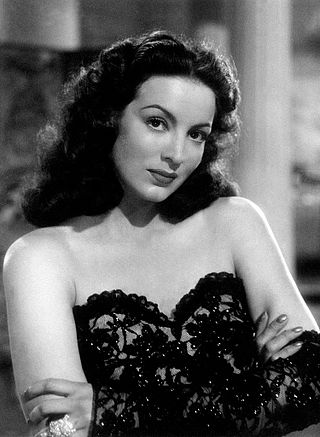
María de los Ángeles Félix Güereña was a Mexican actress and singer. Along with Pedro Armendáriz and Dolores del Río, she was one of the most successful figures of Latin American cinema in the 1940s and 1950s. Considered one of the most beautiful actresses of the Golden Age of Mexican cinema, her strong personality and taste for finesse garnered her the title of diva early in her career. She was known as La Doña, a name derived from her character in Doña Bárbara (1943), and María Bonita, thanks to the anthem composed exclusively for her as a wedding gift by Félix's second husband, Agustín Lara. Her acting career consists of 47 films made in Mexico, Spain, France, Italy and Argentina.
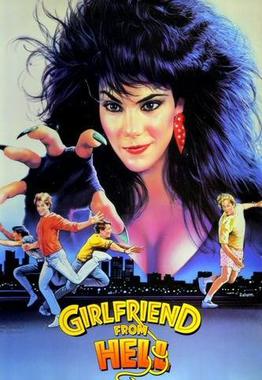
Girlfriend From Hell is a 1989 American comedy horror film that was written and directed by Daniel M. Peterson. The film had its world premiere on April 24, 1989 at the Houston Film Festival and was released to video in August of the following year. It starred Dana Ashbrook and Liane Curtis, and follows a young high school girl who is possessed by the Devil in order to steal souls.

Harris Glenn Milstead, better known by the stage name Divine, was an American actor, drag queen, and singer. Closely associated with independent filmmaker John Waters, Divine was a character actor, usually performing female roles in cinematic and theatrical productions, and adopted a female drag persona for his music career. Born in Baltimore, Maryland, to a conservative middle-class family, Milstead developed an early interest in drag while working as a women's hairdresser. By the mid-1960s he had embraced the city's countercultural scene and befriended Waters, who gave him the name "Divine" and the tagline of: "The most beautiful woman in the world...almost."
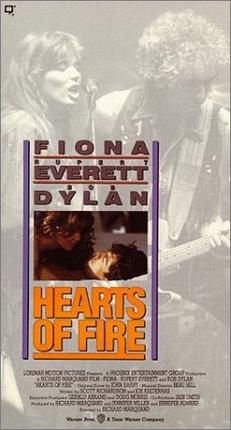
Hearts of Fire is a 1987 American musical drama film starring Bob Dylan, Fiona Flanagan and Rupert Everett. The film was essentially a vehicle for Dylan based on his success as a rock musician. It received poor reviews, a limited theatrical release, and was later written off by Dylan himself.

Heartaches is a 1981 Canadian comedy film written by Terence Heffernan and directed by Donald Shebib. It stars Margot Kidder, Annie Potts, Winston Rekert and Robert Carradine. The movie is about two young women who form an unlikely friendship on a bus ride to Toronto.
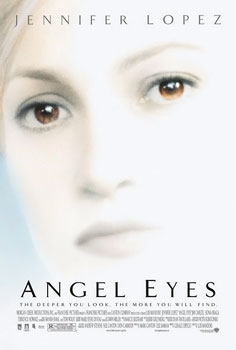
Angel Eyes is a 2001 American romantic drama film directed by Luis Mandoki and starring Jennifer Lopez, Jim Caviezel, Terrence Howard, and Jeremy Sisto. Written by Gerald Di Pego, the film is about a mysterious man who finds himself drawn to a female police officer with whom he forms a relationship that helps each to deal with trauma from their past. The original music score was composed by Marco Beltrami. The film received ALMA Award Nominations for Outstanding Actress and Outstanding Director.

Donald Everett Shebib was a Canadian film and television director. Shebib was a central figure in the development of English Canadian cinema who made several short documentaries for the National Film Board of Canada and CBC Television in the 1960s before turning to feature films, beginning with the influential Goin' Down the Road (1970) and what many call his masterpiece, Between Friends (1973). He soon became frustrated by the bureaucratic process of film funding in Canada and chronic problems with distribution as well as a string of box office disappointments. After Heartaches (1981), he made fewer films for theatrical release and worked more in television.

Whatever It Takes is a 2000 American teen comedy film directed by David Raynr and starring Shane West, Marla Sokoloff, Jodi Lyn O'Keefe, and James Franco. It was released in the United States on March 24, 2000. The film's story is a modern update of the 1897 play Cyrano de Bergerac by Edmond Rostand.
Linda Pauline Griffiths was a Canadian actress and playwright best known for writing and starring in the one woman play Maggie and Pierre, in which she portrayed both Pierre Trudeau and his then-estranged wife, Margaret. Among her cinematic work, she is best known for her acclaimed, starring role in Lianna.

Prom Night III: The Last Kiss is a 1989 Canadian black comedy slasher film and the third in the Prom Night film series, continuing the storyline involving the murderous female ghost named Mary Lou Maloney. This is the only entry to depart from the horror genre, and is instead a spoof of the previous films.

John Lloyd Espidol Cruz is a Filipino actor, model and occasional TV host. Regarded as the "King of Contemporary Cinema" by the media, Cruz has top-billed several box-office successes. He has more than ten films with box office grosses of ₱100 million in the Philippines.

Strangers When We Meet is a 1960 American drama film about two married neighbors who have an affair. The movie was adapted by Evan Hunter from his novel of the same name and directed by Richard Quine. The film stars Kirk Douglas, Kim Novak, Ernie Kovacs, Barbara Rush, and Walter Matthau.

It All Came True is a 1940 American musical comedy crime film starring Ann Sheridan as a fledgling singer and Humphrey Bogart, who was third-billed on movie posters, as a gangster who hides from the police in a boarding house. It is based on the Louis Bromfield novel Better Than Life. Sheridan introduced the hit song "Angel in Disguise". The picture was produced by Mark Hellinger and directed by Lewis Seiler. The cast also featured Jeffrey Lynn as the leading man, Zasu Pitts, and Una O'Connor.

The 19th Toronto International Film Festival (TIFF) took place in Toronto, Ontario, Canada between September 8 and September 17, 1994. Whale Music by Richard J. Lewis was selected as the opening film. The festival's name changed from Festival of festivals to Toronto International Film Festival.

The Void is a 2016 Canadian Lovecraftian horror film written and directed by Steven Kostanski and Jeremy Gillespie, and produced by Jonathan Bronfman and Casey Walker. It stars Aaron Poole, Kenneth Welsh, Daniel Fathers, Kathleen Munroe, and Ellen Wong. The plot follows a small group of people who become trapped in a hospital by a gathering of hooded cultists, and by grotesque creatures.
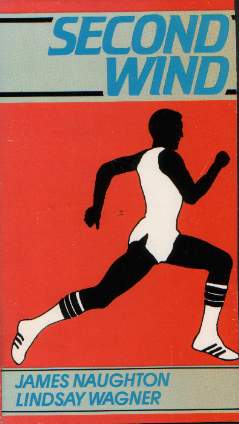
Second Wind is a 1976 Canadian sport comedy film, directed and edited by Don (Donald) Shebib, written by Hal Ackerman, and produced by James Margellos. This was the first feature film starring role for actor James Naughton, who portrays a stock broker whose new jogging hobby turns into an obsession to excel at long distance running, straining his career and his relationship with his wife.

The Ascent is a 1994 American war adventure film directed by Donald Shebib. The film is an adaptation of a memoir by a then Italian prisoner of war in 1942 British East Africa who challenges his English captor in a climb of Mount Kenya.

The Fighting Men is a 1977 Canadian survival television film directed by Donald Shebib, produced by John Trent, and written by Tony Sheer, later released in theatres.
By Reason of Insanity is a 1982 Canadian short courtroom drama television film written by David McLaren and directed by Donald Shebib which examines the use of insanity pleas in murder cases. The film was produced by Alan Burke and made for the anthology series For the Record.
Turning to Stone is a Canadian docudrama television film, which was broadcast by CBC Television in 1986. Directed by Eric Till and written by Judith Thompson, the film stars Nicky Guadagni as Allison Campbell, a woman who is sent to the Prison for Women after being set up by her boyfriend to smuggle drugs from Mexico to Canada without her knowledge.
















